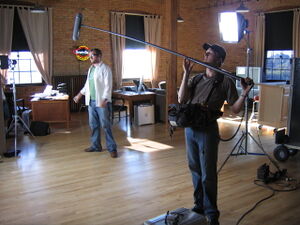Reality television (nonfiction): Difference between revisions
No edit summary |
No edit summary |
||
| Line 17: | Line 17: | ||
* [[Tesla!]] | * [[Tesla!]] | ||
* [[Who Wants to Be a Chronometer?]] | * [[Who Wants to Be a Chronometer?]] | ||
* [[:Category:Reality television]] | |||
== Nonfiction cross-reference == | == Nonfiction cross-reference == | ||
Latest revision as of 14:47, 23 June 2019
Reality television (reality TV) is a genre of television programming that documents supposedly unscripted real-life situations, and often features an otherwise unknown cast of individuals who are typically not professional actors, although in some shows celebrities may participate.
Reality TV differs from documentary television in that the focus tends to be on drama, personal conflict, and entertainment rather than educating viewers.
Fiction cross-reference
2017: Dennis Paulson of Mars, new reality TV show, gets rave reviews.
May 28, 1974: Euglena Junction wins the Prime Time Emmy for Best New Show. Broadcasting live from the Pantages Theater via NBC, host Johnny Carson calls it "an extraordinary study of the genus Euglena, and a brilliant parody of Petticoat Junction."
Student auditioning for Tesla! (1909).
Fiction cross-reference
- Minds in a Crystal - a one-act reality play about the minds of individual people assembled into a time-crystalline structure.
- Reality play
- Tesla!
- Who Wants to Be a Chronometer?
- Category:Reality television
Nonfiction cross-reference
External links:
- Reality television @ Wikipedia



